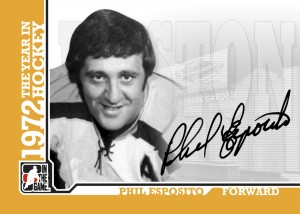 Phil Esposito
Phil Esposito
Born February 20, 1942
NHL Hall of Fame Inductee 1984
Stanley Cups – 1970, 1972
Phil Esposito’s morning routine as a child was layering sweaters and driving with his father in the morning darkness along empty roads to the ice rink. All so he could get hockey practice time in before school. Phil loved to play hockey and his father was there with him, watching him improve. Phil considered himself unbelievably lucky.
One morning the unthinkable happened. In a fast move against an opponent, Phil’s hockey stick cracked and broke. Shocked, he watched the lost half fly across the ice and hit the side of the rink.
He was disappointed that his father was in the stands watching him, but worse, he realized that he had blown it all. He couldn’t ask for another stick even though he wanted so badly, because money in their house was always tight. His father, Pat, was employed by the Algoma Steel Mill.
Dejected, he packed up his skates and headed outside to the car. When his father got in, he didn’t say anything – he just dug into his pocket, counted out three dollars and handed them to his son. “Why don’t you buy a new hockey stick?” he asked.
Phil couldn’t believe it. The stick, he knew, cost almost as much as his father earned in one day. Suddenly he realized that his father wasn’t mad at him, or let down. He realized that his father was doing everything in his power to make sure that he pursued hockey. His father wanted him to do what he loved and win the games he played.
In 1963 he broke through with the Chicago Blackhawks, but his career as a Blackhawk would only last until 1967 when he was traded to the Boston Bruins. In Boston he was part of the great Bruin teams with superstar defence-man Bobby Orr. In 1969 he became the first NHL player to score over 100 points in a season, a feat he would accomplish a total of six times in his career.
The following year saw the Boston Bruins win their first Stanley Cup in 29 years. Esposito continued on his torrid pace as he broke Bobby Hull’s single season record for goals by scoring 76 in the 1970-71 season. This record would stand until Wayne Gretzky scored 92 goals in 1981-82. In 1972 he was the central figure in Team Canada’s emotional victory against the Soviet Union in the Canada Cup.
He retired from hock ey in 1981 and was elected into the Hockey Hall of Fame in 1984. He was the general manager of the New York Rangers between 1986-89, helped land a franchise in Tampa Bay in the early 1990s and was their first general manager.
ey in 1981 and was elected into the Hockey Hall of Fame in 1984. He was the general manager of the New York Rangers between 1986-89, helped land a franchise in Tampa Bay in the early 1990s and was their first general manager.
Phil Esposito was inducted to the Hockey Hall of Fame in 1984 and had number 7 retired in Boston on December 7, 1987.
In his own words, “My dad was a big supporter of mine. He would always come to the games. The first recollection I have is, I think, [when I was] four years old. My dad was putting double runners on my feet, and he built a rink in the back yard as my brother and I were playing hockey. He made a lot of sacrifices. You know he came to every game we played?”
“I think Harry Sinden (coach) and Milt Schmidt (general manager) were career-wise very influential on me because they allowed me to play my own style. I don’t know why coaches wouldn’t understand that. The more I played my own style, the better I played.”
As a leader, what can we learn from Phil Esposito’s experience?









